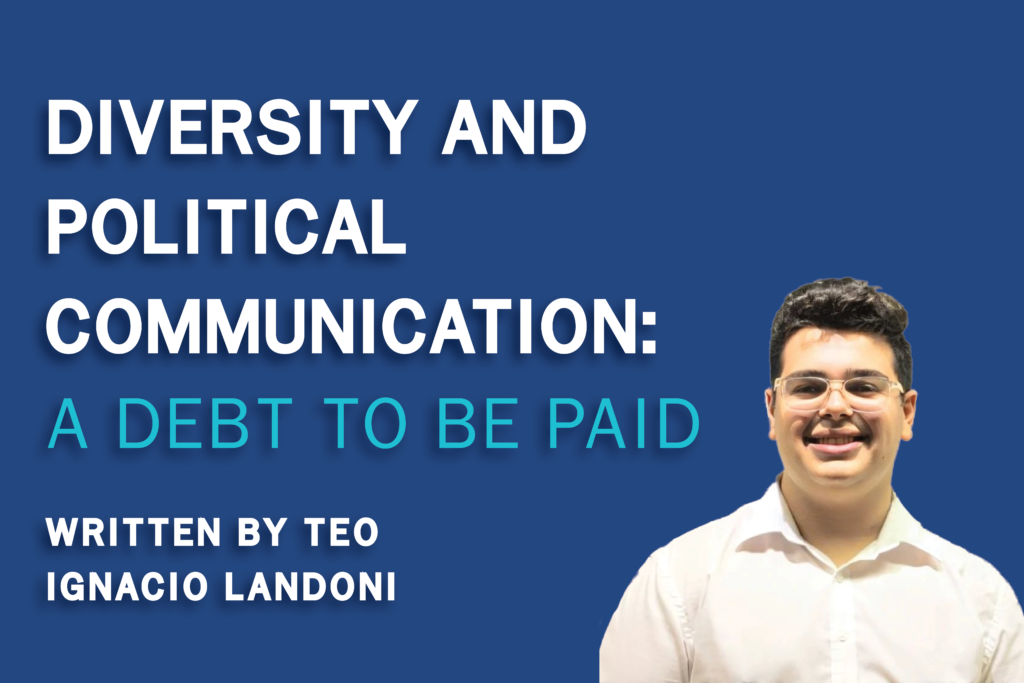Diversity and Political Communication: A Debt to be Paid

Diversity tends to be approached with great caution from political communication professionals, but why?
Personally, I believe that this is due to the fear that political parties have of losing voters if they take a position that may be controversial. This statement stands true not only when talking about problems facing the LGBTIQ+ community, but also when looking at people with disabilities and members of religions that are not practiced by the majority of the population of their country.
Over the years, most societies have advanced towards building a safe, respectful, and inclusive environment for diversity. However, being gay is still considered a crime in 72 countries and punishable by death in eight, trans people in Argentina have a life expectancy of 37 years, and that more than 30 million people with disabilities in Latin America are unemployed.
Communication has a great weight on the reality of these people’s situations. Notable examples of this include awareness campaigns about the stigma that has persecuted individuals with HIV for decades carried out by organizations such as the CDC in the United States, Fundación Huésped in Argentina, and UNAIDS at the international level.
Unfortunately, diversity continues to be dismissed by a large part of society that chooses to blame people of minority groups — such as those in the LGBTIQ+ community — for the “deviation of society” and the “destruction of the family.” Perhaps it is time for society to shift its mindset to prepare the way for generations that are more diverse and can openly expressed sexual orientations, gender identities, religious beliefs and opinions.
If we think about it, it is not possible to find two people who are exactly alike. Not even the most identical pair of twins in the world are going to have the same opinions on everything, because their life story is different, the world challenges them in different ways, and they are simply different people. From this approach, one can say that all people are different and, therefore, we are all diverse in some way. So why is it still a controversial topic in politics?
I think it is time for all political parties to understand that what matters are the ideals and convictions they have. The identity construct of a party is a compelling part of what makes people choose to join and be active members of a political space. When a person identifies with a party and its leaders, they vote for them and give them the responsibility to represent the group and to assert their opinions when establishing public policies.
If we look at the statistics, approximately 10% of people openly recognize that they belong to the LGBTIQ+ community and 15% live with a disability. Factor in all of the different minority groups that people may belong to, and the number is too high to dismiss.
If the parties oriented their policies towards expanding rights and improving the quality of life for those in minority groups instead of looking the other way or being “politically correct,” how many votes would they get in the next elections? How many people would give them the power to represent them?
I believe public relations specialists should work with political parties to direct their proposals and campaigns towards a more inclusive, safe, and respectful society. That way, all people can live in an environment that does not punish, minimize, or treat anyone as a second-class citizen.
It’s time for us to bring forth change. Communication through PR has great power because it gives a voice to people who may not have one. As communication professionals, we have a responsibility to use our expertise and platforms to advocate for minority groups. It is time for communications professionals in the political world to start working towards diversity, equity, and inclusion.

Teo Ignacio Landoni is a first-year student of Public Relations and Institutional Communication at Universidad Argentina de la Empresa (UADE). He currently serves as Secretary of Communication at PRO Diversidad Provincia de Buenos Aires, a political space that works towards the inclusion of diversity in the public agenda. You can connect with Teo via LinkedIn.
